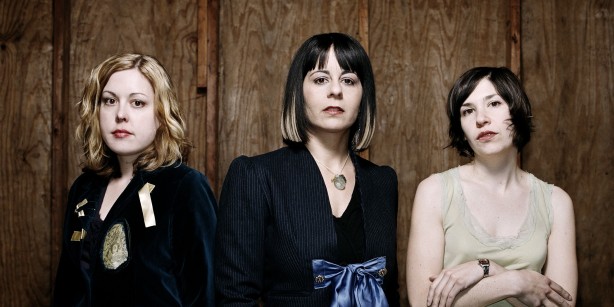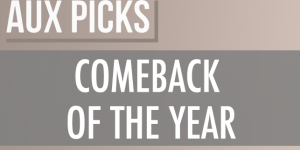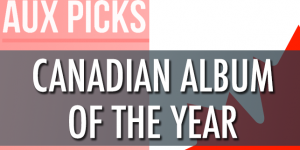 Music
Music
This isn't another essay about women in music
by Ryan McNutt
December 11, 2014
It is an essay about women. And about music. And about women who make music. But it is not about “women in music.”
That may seem like semantics, but it’s an important distinction. We’ve all read features that, in their attempt to celebrate women musicians, end up trivializing or exceptionalizing them instead. Or, we’ve seen concerts or festivals that book women artists together, almost as if to suggest that “women” is its own genre. While sometimes well meaning and earnest, these efforts often come across as token advocacy for something that should just be obvious. As Toronto’s NOW Magazine put it this past summer: “Making a ‘women in music’ issue is as ridiculous as a ‘women in families’ or ‘women in the workplace’ special.”
Yet NOW still devoted its entire summer music issue to women, just as I’m devoting my year-in-review essay to the same topic. And that’s because, in the context of the year that was, I’d be committing a great falsehood if I wrote about anything other than women in music. I don’t think there’s been a year of my musical life so shaped, framed, and defined by women and their voices. From the top of the charts to the bottom of the buzz bin, the bulk of the year’s most compelling records were by women, often with a strong, forceful, authorial voice behind them. These records spanned genres, themes, artistic personae. They were angry, joyous, heartbreaking, funny, powerful.
And here’s the best part: none of these records need a “women in music” essay, or magazine article, or TV feature, to warrant celebration. They didn’t deserve our attention because of their novelty, or their rarity — they simply arrived, presumed and claimed their rightful place in the pop culture of 2014. Their feminine voices were a key element of their greatness but didn’t single-handedly define it, either. They were great records by women, not great “women” records.
And they were great, largely, on their own terms.
While we’re accustomed to separating the pop calendar into years, in many ways “2014” began in 2013.
After all, three of year’s four top-selling albums — the Frozen soundtrack, Beyoncé, and Lorde’s Pure Heroine — not only came out in 2013 but feel part-and-parcel with 2014’s story. It’s not just that they’re all records by women (or, in the case of Frozen, prominently featuring a female voice); it’s that they feel like statements of individuality. In the case of Frozen, it’s through the force of power ballad and a rare Disney anthem that has little to do with explicit romantic desire or family connection. In Lorde’s case, it’s an outsider-as-insider persona and a drive towards pop authority (as evidenced by her managing the soundtrack for the third Hunger Games movie).
Then there’s Beyoncé, arriving by surprise in December of last year and, in hindsight, ultimately signaling the start of the new one. Though undoubtedly calculated, like all things Queen Bey, what was notable about Beyoncé was its aggressive play towards autobiography, from the audio clips interspersed throughout to the incredibly intimate subject matter (both sexually and emotionally). It was a striking change from the shifting pop cypher of the Lady Gaga or Katy Perry mold and, presented as an empowerment statement, it struck a much broader chord than the record’s idiosyncratic material might have suggested at first listen. The year’s most iconic pop image may be the still frame from Beyoncé’s MTV VMAs performance in front of the word “FEMINISM” — a statement at one with the material, yet universal enough for the fleeting moment to be captured and immortalized in Tumblrs and Twitter feeds worldwide.
The other album that bookends the year is Taylor Swift’s 1989, a record that portrays a fated-to-end relationship with similar detail and candor as Beyoncé’s examination of marriage. The only 2014 release to reach a million copies sold, 1989 has been pitched as Swift’s first proper pop album: a bit of a laugh from a musical perspective (it’s hard to consider anything she’s done since Fearless as country) but an important shift in how she’s positioning herself and her music. The catchy-but-generic “Shake it Off” had me concerned that Swift’s compelling songwriting voice — a biting fusion of insightful nostalgia and pop immediacy — might get lost in the translation, but I needn’t have worried. While 1989’s synth-heavy canvas is hardly unique, it still ends up sounding like a record no one but Taylor Swift could have made, just as no one but Beyoncé or Lorde could have made their albums either.
The year saw a similar preponderance of female voices on the singles charts. Though Pharrell’s exhaustingly peppy “Happy” was the biggest song of the spring, it gave way to Iggy Azalea and Charli XCX’s “Fancy” as the eventual song of the summer, with Ariana Grande’s “Problem” (also featuring Azalea) as its closest competitor for much of that time. Then, this fall, Billboard took note that the top five spots on its Hot 100 singles charts were held by solo female artists for six consecutive weeks. (When you include guest spots, there were actually eight women among their ranks.) For the first time since 2009, and only the second time in the past decade, women outranked men for percentage of songs in the Billboard Top 10 through the year.
True, women have always had a prominent place in the pop world (far too often, it’s worth noting, at the behest of male Svengali figures). But step down even a single rung on the pop ladder and what you see are emerging pop voices defined by their authorship. After writing songs for Icona Pop and others, Sweden’s Tove Lo ended up with one of the year’s best slow-burning hits and one of its best start-to-finish pop albums (“Habits” and Queen of the Clouds, respectively). Another Icona Pop contributor, Charli XCX, finally had her proper breakthrough with “Fancy” and, more excitingly, the giddily romantic “Boom Clap,” a song so successful that it delayed her full length, Sucker, to December to give it more room on the charts. Lana Del Rey, always seemingly threatening to be more punchline than pop artist, surprised with the dark, moody Ultraviolence. Sia finally stepped out from behind an impressive songwriting and featured-artist résumé and earned a massive hit with “Chandelier.”
Continue your way out towards the musical fringes and the trend continues: great albums from the likes of Alvvays, St. Vincent, Lykke Li, Angel Olsen, FKA Twigs, Polaris Prize winner Tanya Tagaq, Ex Hex, Jenny Lewis, Perfect Pussy, White Lung, Jesse Ware, Tinashe, EMA… I’m sure I’m missing some of your favourites here, but I think you catch my drift. That’s an incredible diversity of styles, genres, and performances, many reflecting a strong sense of feminine confidence (something noted by Hazel Cilis in her piece for Pitchfork on women artists like Li who reclaimed the “crazy ex-girlfriend” cliché.) My favourite album of the bunch may be Sharon Van Etten’s Are We There, a soul-crushingly complicated, honest take on love, pain, and regret. Songs like “Your Love is Killing Me” play both beautifully familiar and uncomfortably close, written with the mystique of a folk song but maintaining a sonic playfulness by weaving in drum machines, synths and creative harmonies. The effect is an album that avoids sounding like your typical 1974-aping folk record and, instead, feels distinctly 2014.
That’s the thing about Are We There and most of my favourite albums by women this year: they felt current, immediate, like they spoke to the here and now both musically and lyrically. Even the more overtly reflective or generic albums had a freshness to them, whether it’s the omnivore pop tastes of Swift’s 1989 or the gender discourse punk of Against Me!’s Transgender Dysphoria Blues (another favourite, and easily one of the year’s most important records). In 2014, women were making albums that sounded, in many ways, of the moment.
In contrast, the best masculine records of the year wanted to sound like anything except 2014.
The War on Drugs’ massive-sounding Lost in the Dream took Dire Straits as its foundation and drenched it in a swoony, woozy haze of intoxicating reverb. It sits side-by-side on my “best-sounding records” list with the surprisingly great Ryan Adams, which linked Adams’ candid songwriting with a 1980s Tom Petty sheen. I wasn’t as enamoured with the slacker-pop throwback style of Mac DeMarco as others were, but his Salad Days certainly struck a nerve with many. The year’s breakthrough male performer, Sam Smith, has a crossover appeal based on his ability to play into a torch-song crooner image. And Mojo, one of the first magazines out-of-the-gate with its year-end list, gave the honour deservingly to Beck’s exceptionally pretty Morning Phase.
But here’s the thing about Morning Phase: it’s impossible to distance the album from its status as a rather explicit sequel to 2002’s Sea Change, just as it’s a challenge to separate any of those albums out from the eras they echo. They’re all a callback to a glistening past of some sort, choosing to hit a nostalgic nerve rather than a more immediate, present one. This could be, admittedly, more a “rock” problem than a male problem: the genre is, increasingly, a simulation of its past glories, offering no signs of a way forward in our culture. And male performers that escaped or paid little mind to rock’s trappings produced great, inspiring records this year: Caribou, Run the Jewels, Swans, Owen Pallett.
But that’s not to say it’s not at all a male problem. Pit a rock record like the Foo Fighters’ Sonic Highways — quite explicitly, a curatorial museum piece — or the Black Keys’ Turn Blue up against some of the year’s best rock albums by women and the comparison doesn’t flatter the men in the slightest. An album like White Lung’s Deep Fantasy sounds bracingly present; one such as St. Vincent sounds like the future. Sonic Highways and Turn Blue, both decent records, sound predominantly invested in rock’s past — notably, one where male voices dominated.
Requisite caveats time: Obviously, I don’t believe the reason so many men are making nostalgic records is an explicit desire, on some level, for the sort of cultural or social authority their gender has claimed in the past. And, like with all attempts to craft a narrative from the year, there are lots of one-off records that poke holes in my analysis. (Jack White, as an example, is a tricky trickster to pin down, though his love of physical media is quite clearly drenched in golden-age nostalgia.) Finally, there’s a chance this is all a cycle: I’m not the only person to feel like, in many ways, 2014 echoes 1994, one of the biggest breakthrough years for women’s voices in music culture.
But in 1994, there was something revolutionary about the feminine insurgency, from the brash R&B of En Vogue and TLC to the righteous anger of riot grrrl. In contrast, what’s revolutionary about women in music in 2014 is how un-revolutionary it feels. The greatness of women’s albums and songs this year doesn’t seem shocking, or strange, or in explicit challenge to anything: their greatness just feels rightfully earned and, in some ways, obvious. If it wasn’t for culture obsessives like me pointing it out, most people might not even notice how dominant they were.
So perhaps that’s why myself and (clearly) many others were so drawn to women’s records this year: in their self-evident greatness, they sounded like the world as it should be — one that reflects gender balance, if not always a proper gender spectrum — rather than reminding us of the masculine world as it was and, in all too many cases, still is.
What’s more, these albums and songs played against the backdrop of what felt like a watershed year in terms of acknowledging women’s voices. Sadly, in many ways this was done on the most horrific of terms: assault, physical and sexual, through the likes of R. Kelly, Jian Ghomeshi, Bill Cosby, Woody Allen. And there are still millions of miles to go, of course: as just one musical example, credit the thank-god-they’re-back Sleater-Kinney for noting how the festival circuit still woefully underrepresents women in its lineups. Overall, though (and maybe it’s the latent optimist in me talking), the feeling I leave 2014 with is that there’s a noted push within popular culture — and, hopefully, in elements of the culture at large — to not stand by and let male voices dominate the narrative anymore, that we’re slowly but surely starting to expect a culture in which voices from across the gender spectrum take their rightful place.
We’re not living in that future yet, but 2014’s best music felt like a wonderful start to its soundtrack.





